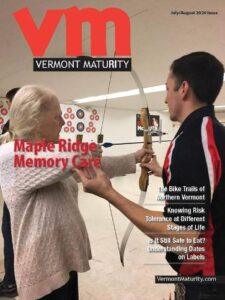When someone is in the last stages of an illness—or suffers a sudden medical crisis—families can be left facing baffling questions about medical care.
Vermont experts say having the proper planning in place can be immensely helpful to your loved ones, ensuring they know your wishes.
“I definitely see advanced care planning as a gift you give to your family,” said Cindy Bruzzese, executive director of the Vermont Ethics Network. “Then they’re not left wondering, ‘Did I do the right thing? Did I make the right decision?’ Because, actually, you made the decision ahead of time.”
Bruzzese said the Vermont Ethics Network has been working for more than 30 years to encourage people to be proactive in planning for their future health and end-of-life needs.
“Waiting until you’re sick or dying to start to have these conversations is just too late,” she said. “It’s a really difficult time for people already in the throes of grappling with life-limiting disease or something catastrophic. Thinking about ‘What does matter to me?’ ‘What is important?’ It’s hard to do that when you’re in crisis. Advanced care planning works best if we do it in bite size steps.”
Glenn Jarrett, partner at South Burlington-based law firm Jarrett & Luitjens Estate & Elder Law, said his office looks at estate planning as a thought process rather than a list of documents to check off.
“We look at it as a planning process that may result in some documents being signed,” he said.
As you and your family begin to think about medical and estate planning, Bruzzese and Jarrett outlined several documents that should be put in place. And they both recommended starting early.
Jarrett and Bruzzese both said that taking the time to plan for end-of-life care and organization can significantly ease burdens for your loved ones.
“Fewer than half of Americans have power of attorney and health care directives,” Jarrett said. “These are very important documents. I can’t tell you how many times family members say the documents made their parent’s dying a lot easier, because they had everything in place and they didn’t have to worry.”
Following are four of the most important planning documents everyone should complete.
Healthcare Agent/Durable Power of Attorney
Bruzzese encourages people to start simply at age 18—or now, if you have no advanced planning in place—by choosing a health care agent. A health care agent makes decisions for you if you are incapacitated.
“Vermont doesn’t have laws that govern who will make decisions for you if you can’t make decisions for yourself and you’ve done no planning,” she said.
Choosing an agent is the first step, and from there, having conversations about your general goals is important, she said.
“For most people, having a general sense of goals and values and having a person you trust is the most important thing in terms of advanced care planning,” she said. “It’s impossible to predict the exact situation you’ll find yourself in.”
A health care agent is the same as a durable power of attorney for health care. Vermont changed the terminology in 2005 when it updated its advanced directive laws, Bruzzese said.
It’s also important to elect a durable power of attorney for your finances. The same person can fill both of those roles, but they can also be delegated to different people.
“Power of attorney is probably the most important document I can do with (clients),” Jarrett said.
On the financial side, Jarrett said it’s important to make sure the document includes provisions for making gifts.
“State law is very specific,” he said.
Unless specifically stated, an agent cannot make a financial gift. The agent also cannot make a gift to himself or herself unless specifically stated. That could be important if the agent is a spouse and he or she needs to transfer assets to receive the best Medicaid benefits.
Advanced Directive
The next step in the planning process is an advanced care directive.
“All Vermonters over the age of 18, and especially seniors, should do advance care planning so their wishes with regard to medical decision-making are known,” said Kellie Parks, communications manager at the VNA of Chittenden and Grand Isle Counties.
“Who will speak for them if they’re unable to speak for themselves due to a health crisis? What kind of treatments and interventions are in line with their wishes and values? It’s so important for families to have a conversation about their wishes and execute the necessary paperwork so their health care providers know what they want.”
Vermont’s advanced directive forms also let you spell out your treatment goals and wishes, limitations on desired treatment, whether you want to donate tissue or organs and your funeral and remains preferences.
“It allows people not just to appoint a health care agent, but also give a little more specific information about what is important to them,” Bruzzese said. “Are there situations that would be unacceptable? Are there things you definitely would want to have done?”
Vermonters can access the forms through Vtethicsnetwork.org. They can also access the forms through their hospital, home health agency or many local agencies on aging.
Bruzzese said advanced directives can be very personalized and individualized. You can fill out as much or as little of the form as you feel ready for, and some people even choose to dispense with the form and write their wishes freestyle.
“This is a one-size-fits-all form, but these decisions are anything but that,” Bruzzese said. “People can feel free to customize the form as they see fit to reflect their priorities and what matters most to them,” she said.
Jarrett said there are several schools of thought in the matter, but he does not recommend getting too detailed in an advanced directive.
“People’s wishes change over time, and you can never predict what a medical situation will be,” he said.
Bruzzese said she encourages people to look at an advanced directive as an evolving document they can update as their situation in life changes. Early on, they can cover basic wishes and goals.
Further down the road as people age or receive a terminal diagnosis, however, Bruzzese said they can work with their doctors to hash out medical orders—specific treatments they may or may not want to receive.
Jarrett also said it’s important to note that a do not resuscitate order is a separate document that must be signed by both a patient and their physician.
For any advanced directive to be legal, you must sign it in the presence of two adult witnesses. Any advanced directive form—like those from other states—is legal in Vermont as long as it is signed and witnessed, according to the Vermont Ethics Network website. You should give copies to your family, agent and physician. Doctors are required to follow your advanced directive wishes.
Jarrett said the state has a free advanced directive registry. Vermonters can send their forms in to the state, meaning doctors can immediately pull up their directive if needed.
“It’s a really good idea, and it’s free,” he said. “We do that for all our clients who are doing that kind that planning.”
Bruzzese said that because the registry is voluntary, it’s hard to have an idea of how many Vermonters have filled out advanced directives, but she said approximately 36,000 Vermonters have registered one. That number is steadily growing, she said, as the group broadens its reach and makes documents more accessible.
HIPAA Release Form
Another important document to have in place is a HIPAA release form.
The Health Insurance Portability and Accountability Act of 1996 is a federal medical privacy law. It means that people—even relatives—cannot be given information about your medical condition unless you have previously authorized it.
Vermonters must fill out a form and choose who can be given information about their medical conditions. You can access the forms through your lawyer, hospital or healthcare physician’s office, or online.
Will/Living Trust
While advanced care planning allows your family to know what to do in case of incapacitation, a will or living trust can ensure your wishes are carried out after your death, Jarrett said.
“Every state has a set of laws that determine what happens to a person’s property if they die without a will, which is called dying intestate,” Jarrett said.
In Vermont, your assets typically go to your spouse if you are married—unless you have children with a previous partner.
“Planning yourself allows you to tailor your plan to your situation,” he said. “The state intestacy laws are not flexible at all. There is no consideration of actual circumstances or facts.”
A will only covers assets that are in your name alone, Jarrett said. If you have a bank account in both your and your spouse’s name, for instance, the assets automatically go to your spouse without probate—the court process of changing the name on the assets.
A living trust transfers assets and property into a trust during your lifetime, then governs only those assets that are within the trust.
Jarrett said it’s important to speak with your lawyer to see what kind of estate planning is right for you.
“A lot of people think one will’s as good as another, but there can be big differences,” he said. “It’s not just a fill in the blank. We want to tailor it to the client’s needs and make it suit their wishes.”
He recommends going over wills or living trusts—as well as life insurance beneficiaries— every three years to make sure everything is up to date, though people may want to do it more frequently depending on their situation.
 Related Articles & Free Subscription
Related Articles & Free Subscription
Choosing a Good Estate Sale Company








Comment here